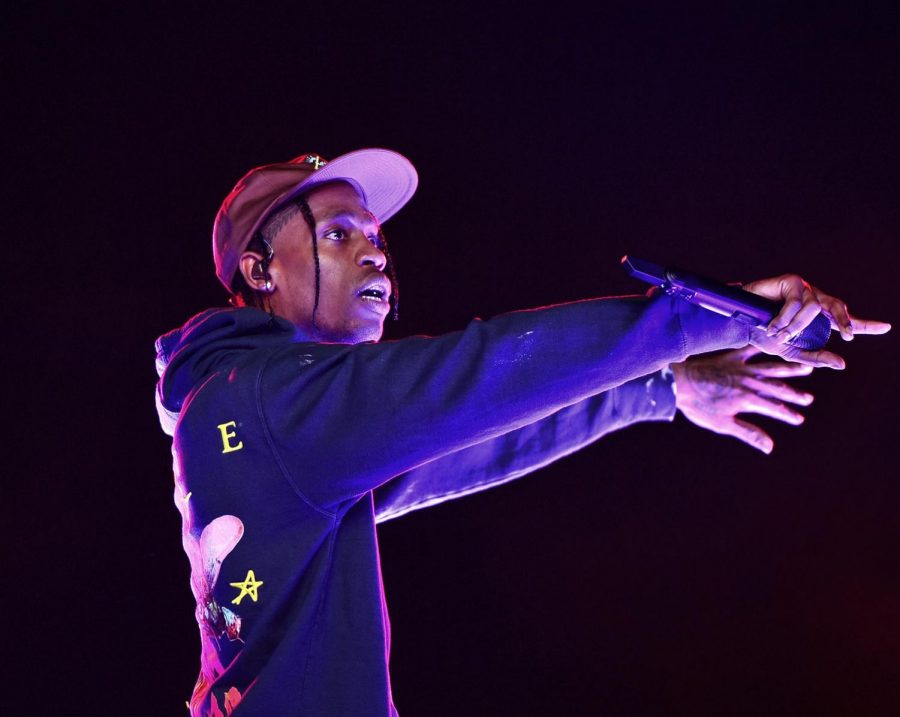Opinion: Don’t go to Travis Scott concerts
Following the death of 10 people and injury of hundreds more, we cannot trust musician Travis Scott and his fans to foster a safe concert environment.
Travis Scott fans need to stay away from his shows. His concerts pose a serious danger to his own fans. (Image via Wikimedia Commons)
November 15, 2021
No one expects to die while attending their favorite artist’s concert. But for Travis Scott fans, death and injury became their grim reality when Scott’s Astroworld festival ended in a deadly crowd crush. Ten people died, including a 9-year-old boy, who was in a medically induced coma until he passed away the night of Nov. 14. Hundreds were injured and 25 attendees were hospitalized. Given the drastic failure of Scott and his team to prevent or handle this dire situation, his fans should refrain from attending his future concerts for their own safety.
“We begged security to help us, for the performer to see us and know something was wrong,” Seanna Faith McCarty, a senior at Texas A&M and one of nearly 50,000 fans attending the festival, wrote in a viral Instagram post. “None of that came. We continued to drown. More and more. One person fell, or collapsed, it doesn’t matter how it started. Once one fell, a hole opened up in the ground … Person after person were sucked down … You were at the mercy of the wave … There were people. Unconscious. Being trampled by every foot that slammed into the ground as each individual tried to keep themselves upright.”
Scott and his team’s negligence is clear in haunting videos of fans desperately asking Scott to stop the show. Fans pleaded with an Astroworld cameraman to stop the show and get help for the injured and dying. Even worse were the dismissive behaviors of some die-hard Scott fans. As ambulances started rolling in, fans blocked their path and danced on the vehicles. Scott did not end the show until 40 minutes after the surge that killed most victims — only 15 to 20 minutes prior to the planned end of the show.
“Who asked you to stop? Y’all know what y’all came to do,” Scott said during the concert.
“So performances, I always want to make it feel like WWF,” Scott said in a 2015 GQ interview titled “How to Rage with Travis Scott.”
The horror at Astroworld, sadly, was not unprecedented: Travis Scott has a long history of inciting loud and packed crowds. Scott was arrested in 2015 after encouraging his fans to jump the barricade at Lollapalooza. At a show in Arkansas in 2017, he was charged with disorderly conduct, inciting a riot and endangering the welfare of a minor. During the Arkansas show, several people, including a security guard, were injured. At a Manhattan concert that same year, fan Kyle Green was pushed off a balcony and left paralyzed.
Green’s lawyer, Howard Hershenhorn, released a statement on Green’s behalf to Rolling Stone about the tragedy at Astroworld Houston: “[Green is] even more incensed by the fact that it could have been avoided had Travis learned his lesson in the past and changed his attitude about inciting people to behave in such a reckless manner.”
Scott’s event planners were aware of the possibility of casualties. In fact, staff members at the Astroworld festival were instructed to refer to dead fans as “smurfs” over staff intercoms. This cold and callous code word illustrates Scott’s disregard for the safety of his fans and for the value of human life in general.
Scott’s failure to end the mania at his concert is abhorrent. Because of his long-held habit of inciting crowds, his own and his team’s negligence and the hivemind behavior of his fans, 10 people have lost their lives. As the pandemic ends and concerts return, artists and their fans must foster spaces safe for all. Scott, who has shown us time and time again that he cannot do that, needs to stop performing at concerts altogether. Until he proves that he has learned his lesson and rectified his behaviors, his fans must stop supporting him and, most importantly, must stop attending his dangerous concerts.
A version of this story appeared in the Nov. 15, 2021, e-print edition. Contact Srishti Bungle at [email protected].

























































































































































